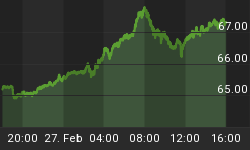Economist John Williams of ShadowStats.com once told a story about an interview he did for a television show. His fellow guest was a Wall Street banker. Before the interview he and the banker had a cordial discussion in the green room about the dire state of the global economy. Dr. Williams was pleasantly surprised to discover the banker, who was to represent Wall Street's view in the on-air debate, appeared to be in complete agreement with his unconventional conclusionsand with his extremely pessimistic views on almost all aspects of the economy.
From the moment the moderator began asking the two men questions, it became apparent that the banker had done a complete 180 turn and was now spouting the same "green shoots of recovery" happy talk that is synonymous with main stream financial television. Afterwards, Dr. Williams asked the man why he agreed with him at one moment then took the polar opposite view on air. The man explained that this was his company's policy; in fact it was the accepted policy of all Wall Street representatives. If bankers went on television and told the truth, people would not buy stocks and would not consume indiscriminately, and companies would not do financings. Such happy talk and reality-defying positive financial statistics streaming from the financial media is designed to maintain confidence in the economy. Some politicians have gone so far as to state that such talk qualifies as a "noble lie," because when people believe the economy is improving they spend and subsequently the economy improves--at least in theory.
In truth, it lulls people into falsely believing things are better than they are. Wall Street goes one step further. It relentlessly disparages precious metals, the one asset class that could provide wealth preservation protection.
This technique is typical of cults. In order to preserve member loyalty there must be an outside enemy, and Wall Street's number one enemy is gold. This is the other side of the coin. Wall Street praises the strengthening economy and cites statistics that are doctored to indicate that employment is improving and inflation is miraculously tame; on the other hand it trashes gold, the one asset that is holding purchasing power. Wall Street knows that when people own gold, they will begin to realize how quickly paper currency is losing purchasing power. When we measure economic in value in ounces of gold rather in the more relative measure of paper dollars, it is impossible to remain asleep to this fact.
Consider this: Since the passing of the Federal Reserve Act in 1913, the US dollar has lost 96 percent of its purchasing power against gold. While on a true gold standard prior to 1913, the US dollar preserved purchasing power even though the country suffered through a civil war. A dollar in 1900 bought almost the exact amount of goods it would have bought in 1800.
As for the strengthening economy that both Janet Yellen and every mainstream financial observer speaks about daily, well, the following US statistics simply don't support this claim:
- The number of people who are on food stamps and receiving government assistance is at an all-time high. While President Obama has been in office, food stamp recipients have increased from 32 million to 47 million.
- The rate of homeownership has been in decline for eight years.
- Disposable income has been declining for the past five years.
- The average length of unemployment has risen from 19.8 weeks to 37.1 weeks.
- The trade deficit with China has grown from $226 billion to over $300 billion in the last five years.
- Only 47 percent of Americans have full-time jobs. The Employment Participation rate is at its lowest level in decades.
These are only a few of the statistics that prove the Fed is intentionally misleading the investing public. The long list of alternative statistics, such as those provided by economists like Dr. Williams, is far more convincing than made up, skewed, CPI unemployment statistics and GDP reports issued by the government. Why? Because everyone who eats, heats, drives, or sends children to college knows that life is becoming more expensive by the day. Fed statistics defy common sense.
To awaken from this delusion, investors need to move beyond "positive thinking" and employ something motivational speaker Robert J. Ringer once referred to as "expanded thinking." Ringer stated, "Reality isn't the way you wish things to be, or the way they appear to be, but the way they actually are." His advice was to expect the best but prepare for the worst. This takes a lot of effort, and few people can adopt such an approach without practice. The simple act of owning gold makes the work of awakening much easier, because it tends to expand our economic vision involuntarily. It provides a standard of lasting value that no longer exists with paper currencies. It allows us to see the insidious forces of inflation and currency debasement directly, rather than as an abstract economic concept.
In conclusion, government economic propaganda, although well intentioned, is as dangerous as anything contrived by Joseph Goebbels (Nazi Germany's Minister of Propaganda). It is preventing people from facing reality and realizing the inherent danger in the economy. It is preventing them from protecting their family's wealth through bullion ownership.
It is in this spirit that BMG will be offering a new service--a library of articles, resources and insights into the state of the real economy, as well as the disparate and often hidden forces that are responsible for the rising price in gold.















